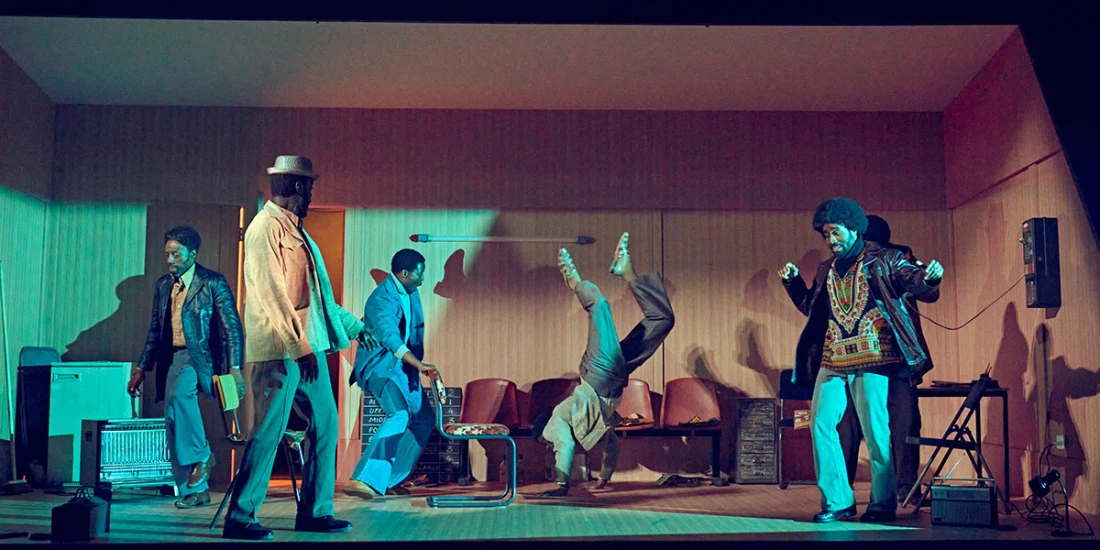'Jitney' review — August Wilson's drama is worth the ride
You’ll be mouthing the words “car service” for some while to come following the vivid Old Vic revival of Jitney, the 1982 play by August Wilson that arrives in London as a co-production with Leeds Playhouse and Headlong and that will continue on tour following this monthlong engagement. (This staging was first seen in Leeds last October.)
The play’s previous London incarnation – imported from New York – won the Olivier for Best Play 20 years ago, and if this production doesn’t quite have the unmistakable stamp of authenticity provided back then by an American cast, it’s always a pleasure to welcome Wilson to a London stage. Director Tinuke Craig follows up her acclaimed regional theatre revival of the musical The Color Purple, confirming anew a keen eye and ear for the American repertoire.
Jitney was the first of Wilson’s extraordinary sequence of plays to be written chronicling the African-American experience across the 20th century, though not the first to come to attention. By the time it was done Off Broadway at the start of this century, the Tony and Pulitzer prize-winner’s name had long been made by such masterworks as Ma Rainey’s Black Bottom and Joe Turner’s Come and Gone. Its belated 2017 Broadway premiere won a Tony.
You can certainly find here dramatic elements that a then-embryonic playwright would go on to fine-tune elsewhere: a father-son drama that anticipates similar tensions in Fences, and a neurodiverse character – a regular passenger called Philmore (Dayo Koleosho) – who will be rewritten in various ways later in Wilson’s canon.
At times, you can feel the play’s mechanics grinding a tad obviously: characters speak in the sorts of set-piece monologues Wilson would later raise to a high art, and some of the plot details feel gerrymandered.
Chief among those is an ending engineered so that the play’s most feckless character, the 39-year-old ex-con Booster (played on press night by a far-younger understudy, Blair Gyabaah, making his professional stage debut to applause from his castmates), can mature in front of our eyes in the final moments.
The more abundant pluses of the evening come with Wilson’s gift for capturing humankind, collectively and singly, in all its contradictions, and Craig’s matching talent for knitting an all-male (with one exception) ensemble into a harmonious whole.
Though the opening sequence feels a tad overplayed, as if the cast are finding both their stage footing alongside their accents, the mood settles as the company eases into roles that come with opportunities amply rewarded here.
Wil Johnson, for starters, is immediately commanding as Becker, the manager of the jitney station in Pittsburgh’s Hill District, where fares are noted on a chalkboard toward the rear of Alex Lowde’s single set. (The door through which the cast enters and exits gets a workout worthy of French farce.)
As calls for rides come in, these men attempt to make sense of various familial and amorous reckonings and obligations, not to mention the potentially imminent demolition of a locale that has been a decades-long home for the longest-serving drivers.
A widower at odds with his scowling, seemingly affectless son, Becker is glimpsed in lowering scene changes that hint at tragedy to come: indeed, the onstage goings-on between the scenes are here integral to proceedings that find an aural echo in Max Perryment’s evocative sound design, not least a nod towards the wreckers’ ball that risks upending this particular community forever.
If that inter-generational conflict poses one of the play’s decisive face-offs, so, too, does the showdown between the gossipy Turnbo (a springy, trigger-happy Sule Rimi) and the hotblooded Vietnam vet Youngblood (Solomon Israel), whose social engagements are entirely (and nearly ruinously) misunderstood by his senior colleague.
An environment where money matters – whether that be a four dollar cab ride or a scant fifty cents – the jitney station hosts the anxieties, dreams, and prospects of a cross-section of people glimpsed at their own decisive turning points.
The cast to a man delivers, as does Leanne Henlon as Rena, Youngblood’s girlfriend who discovers only belatedly what her 24-year-old partner has in mind for her and their young son. I especially liked Geoff Aymer, who amidst an excitable assemblage pulls the audience towards him with his calm, sage reading of one of the play’s senior figures, Doub, a Korean War vet who maintains that the white man is sufficiently uninterested in Black men’s lives to even bother to be racist.
As in Ma Rainey (which does bring several white characters onstage), you are aware of the presence of the white world beyond even as Wilson posits a theatrical landscape not defined by opposition: these people are their own, staking out common ground as part of a collection of characters, and plays, without equal in the American theatre.
I love the exchange at the top of the second act pitting Lena Horne against Sarah Vaughan, not least coming in the very week in which it was announced that the legendary Horne is having a Broadway theatre named for her.
The gathering interplay makes a room full of invaluable theatre personages out of some sharply observed individuals. Wilson would go on to write better-crafted, more poetic plays, but even his early writing deserves attention: Jitney is very much worth the ride.
Jitney is at The Old Vic to 9 July. Book Jitney tickets on London Theatre.
Photo credit: The Jitney company (Photo courtesy of production)
Originally published on
